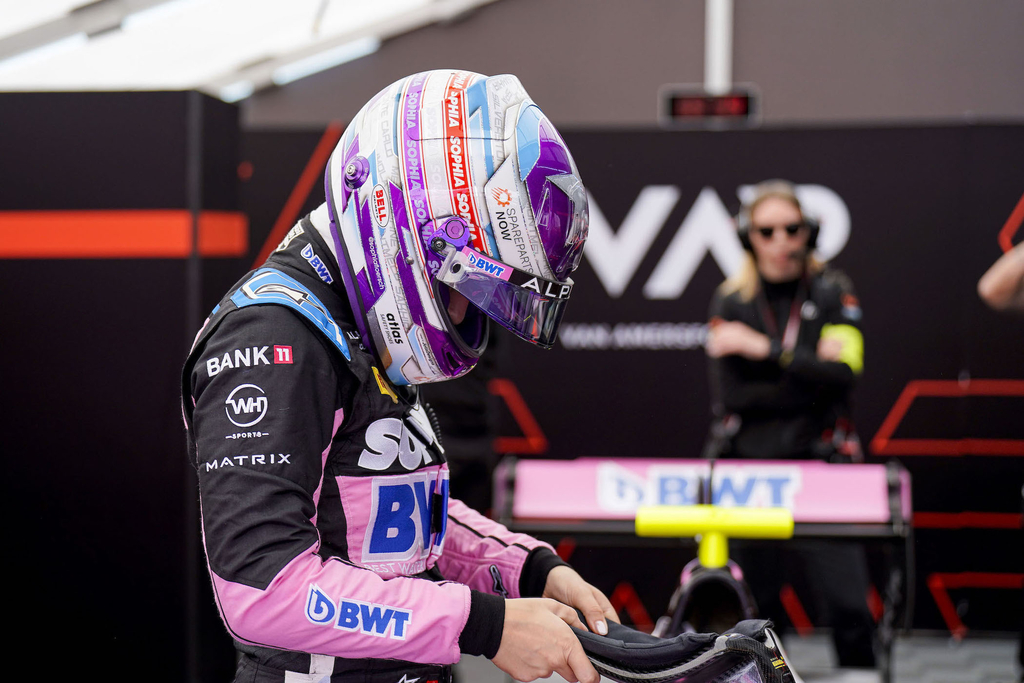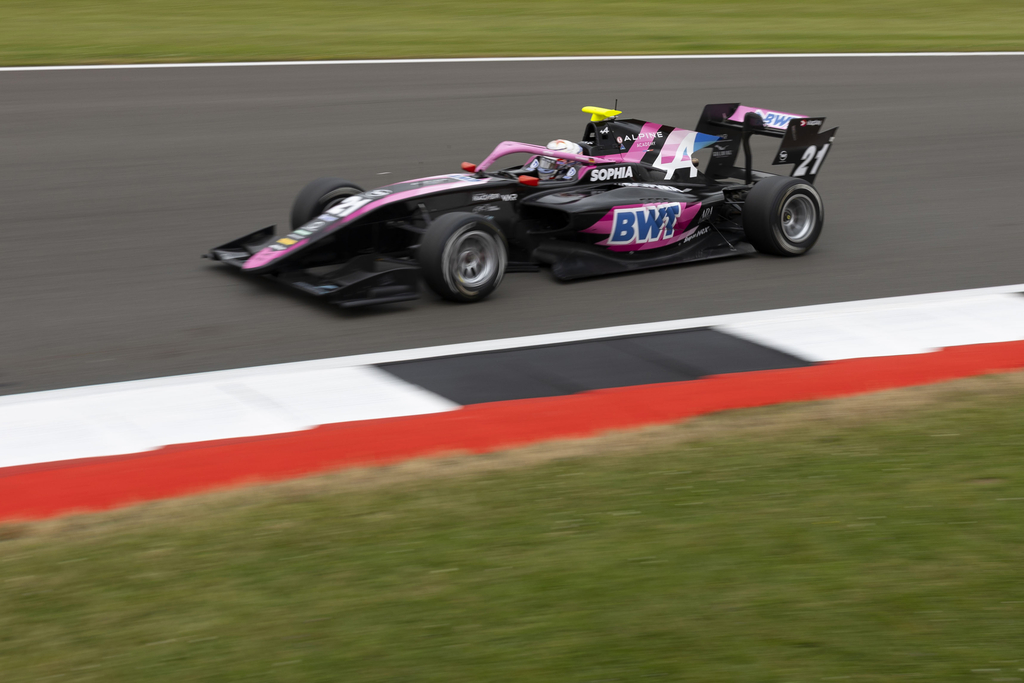Do you remember your biggest accomplishment when you were 14? Formula 3 racer Sophia Floersch does. At the 2015 Ginetta Junior Championship, Floersch set the record for the youngest driver to ever win a race at the yearly one-make racing series in London.
Since then, Floersch has competed in several series like GJC, F4, F3 Euroseries, WEC, ELMS, FIA F3, including one particularly harrowing race at the 2018 Macau Grand Prix, when she was catapulted into the air from a front-left suspension failure in her vehicle. This ordeal didn’t keep Floersch away from the track too long, when she raced in the Formula Regional European Championship less than six months later.
Now, Floersch hardly ever has a chance to slow down, even if she wanted to. When she’s not racing, she’s cataloging her rise to glory across social media, including YouTube and Instagram. Floersch sat down with Playboy to discuss the hard-earned lessons in her career, her passions outside of racing, and her dreams of breaking into Formula 2 next year.
Playboy: First off, how does it feel to be a trailblazer for women in F3 racing?
Sophia Floersch: Its no secret that motorsport is dominated by men — if not exclusive to them. The competition for me starts way before the start line at the racetrack.
It’s not only competing against other drivers, but also having the drive and the courage to pursue my goals.
I’m really happy if what I’ve done helps other women find the inner strength to go after their goals — even in areas where no one else has done it before. Obviously, I’m kind of proud of what I’ve achieved in my career so far.
I mean, when I started racing it was always my goal to end up in Formula 1 or in Formula classes. Like every driver, I want to show that I am the fastest on the track. I want to fight for the world championship.
And I mean the FIA F3 Championship…it’s one of the most competitive junior classes you can actually do. It’s super high level, so competitive with 30 pilots within one sec per lap. Just being part of it — one of those 30 drivers — is a huge honor and makes me super proud.

Playboy: To that end, what are some of your goals with your racing career?
Floersch: My aspiration has always been to race with the best of the best. From the beginning of my career, I’ve worked very hard with my team everyday towards that goal.
Although I’m taking it one day at the time — you could even say one lap at the time — my aim is to race in Formula 1. I want to fight for the World Championship. The decisions my team and I are taking in terms of training, partnerships, and brands are directed towards achieving that goal.
I work with small goals. What counts is the next race weekend, the next race, the next qualifying session, the next free practice and the next lap. It’s these steps where you always have to improve yourself and you have to make the best out of it. Take the chances you get. Then, you can kind of progress upwards.
I think it’s quite understandable that my goal for next year is to move up to Formula 2. It often depends on other people and companies. To put it soberly: it requires a budget of 3-4 million per season. So yeah, we’ll see. Maybe in 2025. Maybe in 2026.
Playboy: What are the biggest challenges that you’ve faced so far?
Floersch: Organizers, teams, sponsors, the media, and fans themselves have experienced motor racing as a male sport from its origins. This means that opportunities gravitate naturally towards male drivers. So, in addition to facing the challenges that come with motor sports, I’ve had to draw their attention to how fast I can drive, regardless of gender.
Every year I face the biggest challenge anew and have to find a way to answer the most important question: What makes most sense for you if you’re a driver who doesn’t have enough of a budget from back home and who needs to find sponsors and partners.
The most important rule is “In racing you need three things to be the fastest: pilot, car, and team.” The car and team set the technical performance limit. You can not get more than 100% out of it. It’s physics. Therefore the biggest challenge is to always see which team with how many tests and so on fits you the best. How you can prove how good you actually are.
I’m not working with the same budgets as the average, by far. This has the consequence of tackling every event without a test day. Others have dozens of these opportunities to work on themselves. What do you think — who has more talent?
In return, I offer my partners the biggest story and probably also the greatest advertising value. The potential ROI is the kicker in a partnership with me.
Playboy: What’s your favorite aspect of F3 racing?
Floersch: It’s no coincidence that Formula Racing is placed at the top of the sport. The technology, the circuits, the demand of the calendar, all of it is unparalleled. Even the smallest detail matters. The difference between victory and failure is down to millimeters, hundredths of seconds. It’s laser-guided clockwork. I don’t think I could experience that level of intensity anywhere else.
If it’s yourself when driving or when working with the team, finding the best car setup, fighting on the track with the best pilots all over the world, whatever.
It’s such a competitive series with 30 drivers on the grid that you really have to be so focused on and off track. That’s actually something I love because I love hard and precise working. I love searching for the last couple of tenths of a second, let’s say.
And also obviously just the fine line between actually having success and also failing which is obviously not that nice. [laughs] But I think that’s what makes the sport special. There are many more things. I mean, in the end, you have so many people working with you, to make the best out of a weekend or a single which is a lot of fun.
The car itself is just amazing to drive. An F3 is so damn fast. Actually, it’s faster than the most expensive hyper cars. The car has a cool sound. It’s a very intense feeling to race with it. The high you get…it’s something I think many people dream of and I’m really thankful for where I’m actually right now.

Playboy: When you’re not practicing, when you’re not racing, do you ever just drive for fun?
Floersch: I love driving around on my Alpine A110. Whether it’s a short drive to meet up with friends, or driving across Germany I’ve always enjoyed the freedom of driving. Mind you, driving a street car is a completely different story from sitting behind the wheel of a Formula car.
In that sport, it’s not like tennis or soccer where you have a tennis court next door, and you can just go there for 10 minutes and play.
It’s very complicated [to practice], sadly. And very expensive. A testday is about 25000 Euro, in F2 teams asking for 45000-60000 Euro a day. I am not really often in the race car apart from when it’s actually race weekend. So you try to enjoy every single time you’re in a race car.
I focus on training in the simulator, fitness training, running, cycling, boxing and functional training. In 2019, a year after the Macau crash, I ran the Berlin Marathon. I think I’m pretty fit.
I don’t really go a lot on other race tracks with other cars because I just don’t have time. Ok, in general if it’s a quick ride in a sports car like my Alpine A110, I just love going around and having some fun. I simply have a lot of fun driving a car at the limits of physics.
Playboy: You once said that you’re “always learning” and that you’ve “never learned enough.” What’s something you’ve learned recently, whether it’s on or off the track?
Floersch: That things happen for a reason. Driving through life is completely different from driving a race car where you do have complete control. In life, there are a thousand things you depend on, and on which you have limited influence — if any. It’s about taking the good with the bad, and making the very best of what’s in front of you. I never take an opportunity for granted, and always try to make the most out of it.
Just last week, I had my first Formula 2 test day in England. I was super fast straight away without ever having raced the F2 car before. The steering and brakes are great. I felt very comfortable. The aerodynamics are great fun. The F2 suits me in terms of its requirements. And it is simply much faster, almost on a par with the F1. The car was so insane to drive, it was I think one the two best days I had in the last one and a half years.
If you are not the one deciding in the end, and you’re kind of depending on other people and other people’s choices, sometimes you obviously won’t agree with everything. Sometimes you have some hard days because it feels like everything stops. Feels like things just don’t make sense. That’s the frustrating and mentally tough side of the sport. You simply need money to be successful.
In Motorsport you can buy performance. Of course, every day in the F3 / F2 / F1 car makes you faster. You can simply work on yourself and learn who to work at the limit. Let me put it this way: sit in the race car as often as you can, drive as many races as possible, drive in the best team, practice, practice, practice… and meet the right people to help you get to the top. This is all the more true for women. There are parents who buy whole teams. That’s how it works.
But on the other side of that, some days things open up which maybe you’ve never thought would ever open up. And I think that’s something I’ve learned. Also, just to take every single chance you actually get.

Playboy: What is your secret to success?
Floersch: It’s no secret really.
- To always keep sight of my goal. It gives sense and purpose to the work, the effort, and the trade-offs that I have to make every day.
- Keep believing in yourself.
- Enjoy it. I think enjoying what you do is really crucial and most important to success.
- Always keep fighting. Kick ass, to put it simply.
- Stop doing the things you may not want to do.
Playboy: What’s a weakness or vulnerability that you’re looking to overcome?
Floersch: Being vulnerable is what keeps me grounded, so rather than trying to overcome it, I fully embrace it every day. I like to think of myself as a sensitive, light-hearted, warm person. I don’t know how I could deal with the stress of taking a bend at 320 km/h if I were any different.
I’m really emotional about some things, because in the end I know how much hard work myself, but also the whole team around me, has put in over the past years.
Playboy: At this juncture in your career, what are some of the accomplishments that you’re most proud of?
Floersch: I was four years old when I first sat in a kart. I won a German championship at the age of eight and a European karting championship at the age of 10. I was the first female racer in F4 who finished several times on the podium of an international F4 series.
I showed how a women can fight for a comeback after a horrible accident with a speed of over 270 kmh. I raced the 24h Of Le Mans — the mother of all car races — and finished P9 in LMP2 with Richard Mille Racing.
I raced the WEC World Endurance Championship at the age of 21 and finished in the Top 10 several times. In the European Le Mans Series, I got a P2 and P3 podium placing.
I am the first woman who scored points in FIA F3. I am still the one and only woman in F3. Close to F1 and more than three to four years ahead of F1 Academy series. I am a member of the BWT Alpine F1 talent team.
In 2019 I was honored with the Laureus Award for my comeback in front of the really big names in the sports world. I am also an ambassador of Wings For Life foundation. Also, how many sportswoman are the main character of an award-winning 92 minute documentary at the age of 23?
These are the great successes. When I think back on it, I get emotional.